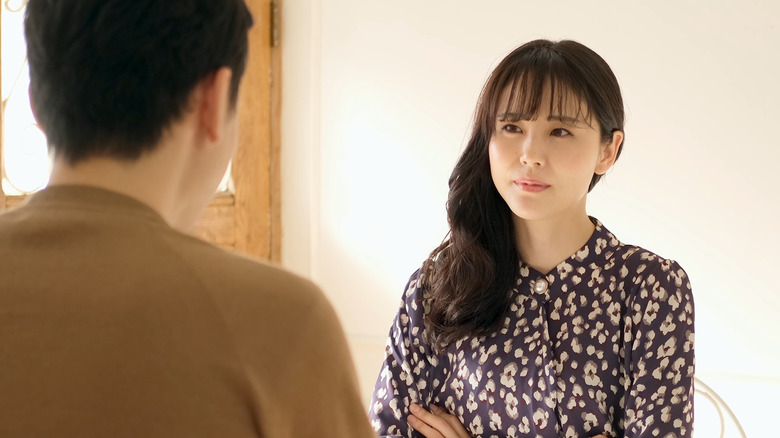12 Red Flags To Be Careful Of When Dating After Divorce
Navigating today's dating environment is daunting enough, but doing so post-divorce can add layers of stress and uncertainty for anyone taking on the challenge. It doesn't take a psychology degree to understand that divorce is a challenging life event, and dating afterward can be entangled with confusion, residual hurt, and unhealthy coping mechanisms. However, the end of a marriage doesn't mean that all hopes for romance have also ended. A finalized divorce can be the start of a new life and another chance to find happiness, companionship, and love in another person.
Reentering the dating scene in a mindful way plays a massive role in romantic success, and being observant of unsettling traits can save you time and heartache in the long run. Though problematic behavior definitely exists in others, we should be able to recognize it in ourselves as well. Here are some dating red flags to keep an eye out for when considering new relationships after a divorce.
Ignoring your post-divorce emotions
On average, it takes about a year to finalize a divorce in the United States. However, this statistic only accounts for the length of legal proceedings — it doesn't quantify the time it takes to recover emotionally when the process ends. The matter might be concluded in the eyes of the law, but the emotional toll of divorce hasn't been magically lifted off of your shoulders.
The Cleveland Clinic affirms that allowing yourself time to process how you feel can positively impact your emotional recovery after divorce. Life changes dramatically when a marriage ends — living arrangements change, financial situations change, and you have to engage with the world differently than you did before. This shift requires your attention. Ignoring the residual negative feelings that accompany the end of a marriage can indicate trouble in your future relationships. The pain, rejection, and resentment commonly experienced after divorce are valid emotions that deserve your consideration.
A 2022 study published in Clinical Psychology & Psychotherapy shows that acknowledging and working through unpleasant emotions and nurturing self-acceptance are vital factors in post-divorce life satisfaction. Managing negative feelings looks different for everyone. It could mean seeing a therapist, spending time with friends and family, or rediscovering old hobbies. No matter the method, putting in the time and effort to heal after an emotionally trying event like divorce will pay off in the long run.
Comparing your new partner to your ex
Comparison is the thief of joy, which can be true in multiple ways.
It's entirely possible that your former spouse is a good person whom you still admire, but irreconcilable differences led you to divorce. A lack of bitter feelings is a good thing, but wishing your new partner would act more like your ex doesn't do justice to anyone. On the other hand, your divorce might have happened because of your ex's transgressions, and now, misplaced blame and anger are getting in the way of happiness with your new love interest. Either way, a new relationship is an opportunity to learn and experience the qualities that make your new partner unique. And nothing kills a budding romance like comparing them to someone else. Whether positive or negative, assigning the behaviors and attributes of your ex to your current partner is unfair, especially if these conclusions are drawn before really giving them a chance to express their character.
Giving your new partner the benefit of the doubt doesn't diminish the need for standards and boundaries; however, seeking similarities or assigning blame to your new partner can be damaging to your relationship. Few things are more frustrating than paying for mistakes you didn't make, so don't try dating again if you feel you aren't ready to trust, be vulnerable, and give a chance to the person making an effort to enter your life romantically.
Rebound dating
Divorce often leaves people feeling inadequate, unworthy of love, or uncomfortable at the thought of loneliness. It signifies the end of a significant relationship, and depending on the length of the marriage, this can be the first time in a long time that you're feeling what it's like to be romantically unattached. In addition to the emotional impact of being separated, the physical change of an altered living situation can be especially jarring.
Divorced people can fall into the trap of seeking an immediate replacement for their ex-spouse to avoid the uncomfortable experience of being alone and having to confront post-divorce insecurities. Dating immediately after a breakup is known as "rebound dating," and it comes with its fair share of problems.
Since rebound dating is an act of immediate gratification and avoidance, the needs and feelings of your new partner can be easily overlooked or willfully ignored. As physician Kristen Fuller advised in an article for Psychology Today, "Make sure you are over your ex and are not trying to replace one person with another or fill a void. Do not use one human being to get over another; you are potentially causing harm to someone else by doing this." Remember that healing doesn't happen when another person is being used in the process. Feeling satisfied with yourself while single can help with future dating success as it leads to self-assurance and confidence, so capitalize on some alone time by rediscovering what you love about yourself before seeking a rebound for validation.
Reactionary dating
According to clinical psychologist Amy Stark, reactionary dating occurs when a person seeks a relationship with someone completely different from their ex. Stark warned in an article on her site that just because a relationship with one type of person didn't work, that doesn't mean dating someone with the opposite personality will be any better.
"If you are unable to see that some of the traits and qualities in your last significant other were actually good, then chances are you are not ready to date," Stark explained. Realistically, there had to be some reason that the marriage happened. Think of it this way: At one point, you and your spouse experienced a level of attraction or admiration that led to you signing a government-recognized piece of paper before witnesses. If not, there likely wouldn't be a divorce to speak of in the first place.
Strong feelings of indignation and bitterness can indicate unresolved emotions that should be acknowledged before dating again. Being vigilant against reactionary dating can save you from wasting your time, energy, and emotional effort on an ill-fated match. Sure, your relationship with your ex didn't work out. Still, chances are that choosing to date someone purely because they're the complete opposite isn't exactly a recipe for success. Choose your partners wisely, and consider them as individuals independent of how similar or dissimilar they are to your ex.
Setting low standards for your new partner
The quality of new relationships after divorce affects a person's well-being. This applies to anyone looking for a new relationship, but people exiting marriages can be especially prone to low-self esteem, especially if they were not the instigator of the split. Since the experience of going through a divorce can leave you feeling doubtful about how lovable you are and what you deserve in a relationship, it's possible that your standards and expectations for romance might drop afterward.
Nevertheless, it's important to remember that breakups do not determine your worth, and maintaining relationship standards can prevent disappointment in your future dating endeavors. You don't have to atone for your divorce by settling for a subpar new partner. Research on single mothers following divorce suggests that relationship quality in post-divorce relationships makes a difference — leading to more enjoyable experiences, more profound levels of trust, increased perceptions of security, and higher overall chances of happiness.
Divorced or not, you deserve to be treated well and to have a partner who respects you. Caring for yourself can help you to avoid forming connections with people who don't intend to show you the consideration you merit.
Badmouthing your ex
As your parents may have told you growing up, if you don't have anything nice to say, don't say anything at all. Badmouthing your ex will most certainly make your date or new partner uncomfortable, but it also has a negative impact on your own mental health. Even if your opinion of your ex is not the best, it is wise to keep any defaming thoughts or comments to yourself or talk them through with a licensed mental health professional.
Airing out all of your harsh opinions about your ex to your new special someone isn't a testament to how great they are in comparison. If you want to compliment your new partner's behavior, do so without mentioning how someone else has disappointed you. Saying disparaging things about your previous partner can make your new one wonder if you'll also talk about them negatively if things between you don't work out.
Play it safe and be gracious (yes, even if your ex doesn't deserve it).
You're being pushed to commit
It's normal to have little to no desire to jump head-first into a committed relationship right after you've exited one, and there's no reason to rush. The casual dating scene is still alive and well. As long as you communicate your stance to those you intend to date, there is nothing wrong with staying away from anything too serious. Casual dating is a great way to meet new people, explore your desires, and consider your options.
With this in mind, avoid potential partners who try to twist your arm into forming a commitment after you've communicated how you feel. Sure, it can be flattering to know that someone doesn't want you to slip through their fingers, but the desire for exclusivity should be completely mutual. If that relationship is meant to be, the opportunity will still be there when the time is right. In the meantime, don't let coercion disguised as eagerness and devotion cloud your judgment.
It's possible you'll meet people who are looking for something serious — and that's fine. However, they should find someone who has that same goal. Issues can arise when you've stated that you're seeking something casual, and their first instinct is to convince you to conform to their desires. The people you date should listen to how you feel and take you seriously.
Your new partner minimizes your past marriage
Like it or not, your past marriage was a time in your life that significantly impacted who you are now. It might not have gone as you planned, but that doesn't make you a failure, and it doesn't mean your time spent in that relationship was wasted. Looking back on that period of your life with reverence can help you move forward more confidently and compassionately, and no one has the right to make you feel ashamed or belittled for having been in a relationship that didn't see you to the end of time.
Your life experiences are not someone else's comedic material, so avoid potential partners who make jokes about, or minimize, a point in time that could still be a source of pain for you. Being unable to express yourself to your romantic partner without fear of being made the butt of a joke forces you to bottle up how you feel, and the negative effects of low levels of trust can lead to a relationship that is difficult and unfulfilling.
It's not a funny joke if it is made at your expense, and bullying shouldn't be a ritual in anyone's romantic life. In fact, diminishing a person's sense of self-worth through verbal harm is a form of emotional abuse, so if you find yourself in a situation with a potential partner who thinks the traumatic events of your past make for a good laugh, that's an appropriate time to leave.
Your new partner exploits your ex's faults to make themselves look better
If you open up about your past marriage and why it ended, your new partner shouldn't use your ex's behavior to make themselves look more desirable in comparison. First of all, it's probably a race to the bottom — your new partner should endeavor to be a better match for you than the person you divorced. Insults and smug remarks are entirely unnecessary, and a superiority complex has never been a good look on anyone. This is a rule that goes back to the playground: Talking about the faults of others to make yourself shine does more to harm your character than help it.
Even if your new partner believes they are better for you, they should show it rather than try to explain it — actions speak louder than words, after all. If they think that depreciating words are necessary to drive the issue home, signs point to insecurity.
Another risk that can accompany this tactic of comparison is the justification of their own shortcomings because they ultimately see themselves as "not as bad" as your ex. They might see this as an opportunity to avoid self-improvement and forgo putting forth equal effort in your relationship.
You're frequently having to shut down nosy questions about your past relationship
While experts tend to agree there is no "ideal" time to bring up a past marriage to a prospective partner, some do recommend getting the conversation out of the way early on. "I'd recommend the topic be raised during a first date," Dr. Kelly Campbell, a psychology professor at California State University, told The League. "People don't have to force the topic, but whenever prior relationships naturally come up in the conversation, they should mention their divorce."
Once you bring up your divorce, though, your prospective love interest should not pry too deeply into your past marriage. Of course, they might have questions that stem from concern for your well-being and the health of your current relationship, but their curiosity shouldn't go beyond what is currently relevant to the two of you.
There is a distinct difference between showing concern and being nosy. If you aren't asking for support in the form of a listening ear, then your new partner doesn't need to hear the ins and outs of your divorce, and they shouldn't demand more information than what you are willing to give. It is, however, wise to communicate triggering behaviors, fears, and concerns.
Your new partner isn't respecting your parenting boundaries
As a parent dating again after a divorce, there are a whole different set of worries and risks to consider. Not only are you seeking a person who will fulfill your needs and desires, but you must think about what is best for your kids.
To safeguard the wellness of your children, you undoubtedly have boundaries in place to protect not only their physical bodies but their hearts as well. "Children are already getting used to the fact that their parents aren't or soon won't be living together. ... Introducing yet another change — a new person to share the already diminished time with a parent — may be best put off until everyone settles into their new lives and routines," New York-based divorce and family law attorney Lisa Zeiderman explained in an article for Psychology Today.
Children can suffer from emotional distress if exposed to a romantic revolving door, especially when they are unsettled. Holding off on introducing fledgling romantic prospects to your kids until you have confidence in the relationship's longevity, trust has been established, and the family has become more comfortable with post-divorce changes is typically advied. When presenting this boundary to your prospective partner, their response should not be to challenge you. You have a responsibility to act in the best interest of your children, so a person who has no regard for your role as a parent simply doesn't deserve your consideration.
You have conflicting values
You should definitely consider your new partner's lifestyle before making a serious commitment. As a person who has been married before, you probably have a good idea of how important it is to share values and goals in a relationship, and this can be difficult to do if your priorities don't line up.
It can be awkward and uncomfortable if you and your new partner can't agree on what your relationship should look like, what you hope to accomplish, and where you want to end up. Having mismatched values can leave both of you feeling as if you're always compromising and never truly getting what you want. The sensation of always meeting in the middle and not being fulfilled are indicators of incompatibility.
Having shared hopes and dreams for the future can lead to fewer arguments and contribute to relationship longevity. Consider this: If your goal is to take advantage of your newfound freedom and explore the world, you probably shouldn't date someone who wants to settle down right away. Or, if you're a family person, you should reconsider dating someone who considers it a chore to spend time with loved ones. According to Psychology Today, having mutual core values in a relationship is necessary for longevity and satisfaction since they are at the root of how you live and make decisions. Have a conversation about your core values with your prospective partners before leaping into a new relationship.












